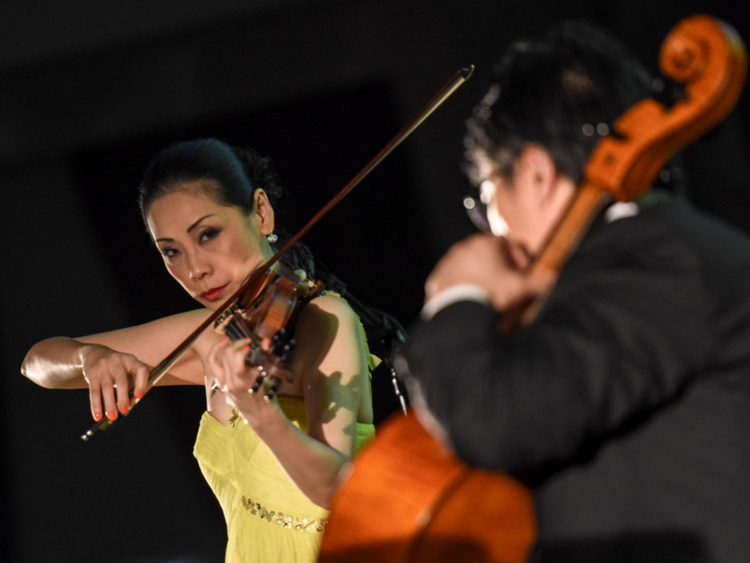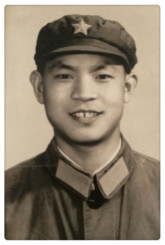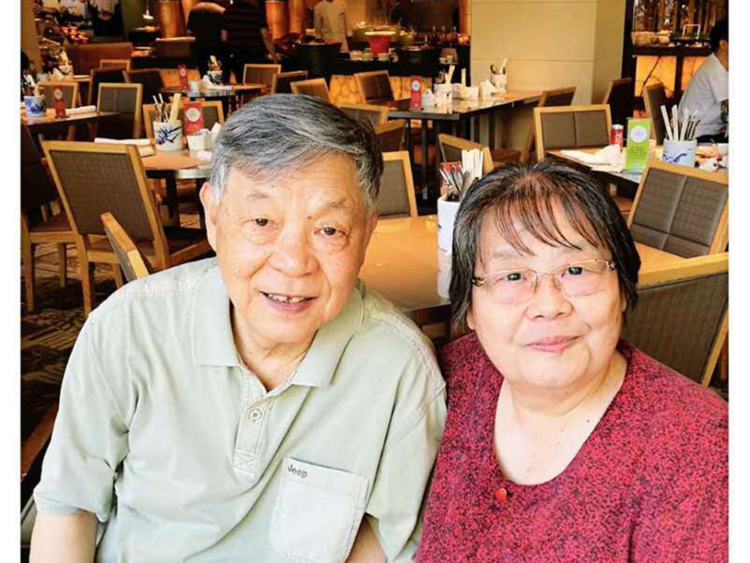
Stories about China’s Red Guards, Mao Zedong, harsh punishments for disagreeing with China’s Cultural Revolution, life under communism and a strict education model were not what I expected to be discussing when I arranged to meet with the world-class musician Min Yang for Weekend Review. But as it turned out, the story of her upbringing in China touched on every one of those topics and more.
In a classic cream knee-high dress with big oval shaped stones on its neckline, tight around the waist but loose from there on, hair tightly pulled back, shoulder length sparkly earrings and colourful high heels, Yang looked as elegant as the handful of times that I had met her in Dubai.
We met at her apartment in Dubai Marina where the Chinese-born British violinist lives these days. The apartment is homey, decorated with several arts and crafts positioned on walls and on display. The spacious living room, with its floor to ceiling windows, has one of the best views of the cosmopolitan city. An old violin (which I later learn was made in 1740) placed in a case, with the inside lid plastered with several black and white photographs and a musical note, stands along with musical pages about a metre away from the window.
“Can I get you a tea or coffee? I make great coffee, you know,” Yang offers as we sit at the table in the kitchen area which overlooks the living room.
Yang has enjoyed a successful career playing for some of the world’s most prominent orchestras including the BBC Philharmonic Orchestra and the London Symphony Orchestra, but according to Yang that is nothing new in her family as she comes from a long line of talented musicians.
“My mum’s parents were both musicians. My [maternal] grandfather wrote the first music dictionary in China by hand, using a traditional Chinese brush. My mum has nine siblings and they are all musicians, but one.”
Sociopolitical movement
Yang’s father, Yang Young, was in the military and her mother, Liu Hong, was studying music when she became pregnant with Yang during the height of the Cultural Revolution in 1967. The revolution was a sociopolitical movement set in motion by Mao Zedong, the founding father of the People’s Republic of China, and aimed to preserve the true communist ideology. The Red Guards, a paramilitary group formed by the students, marched across China attacking the old Chinese customs, culture, habits and ideas, in an effort to make the country more “red”.
“The students were going around and beating up college professors, intellectuals and so on. This was the Cultural Revolution … my mum didn’t agree with the beatings of professors and was labelled as ‘one of them’ so she was arrested.”
A pregnant Hong was placed under house arrest where she was provided with only the absolute basic necessities. According to Yang, she was given little food, nothing that she considered nutritious for her baby, and was held in a cold, damp environment. She was finally released from house arrest in 1968, in time to give birth to Yang.
“In those days, it was common for people, neighbours, to report on each other. People started asking for her. She had given birth six months earlier, so where was she? What was she doing?”
Hong was summoned and sent to be “re-educated” in Guizhou, a very remote and under-developed village.
“She had to eat with the peasants, go to work with the peasants. Go to the field with the peasants. You were re-educated as a peasant. The experience was supposed to make you redder in your heart. Physical hardship was supposed to be good for you.”
“There was no way to take a baby there, it was very primitive. You had just about enough to survive, I wouldn’t have survived. At this stage the three of us lived in three different cities. My mum was in Guizhou, my dad was in Beijing and I was in Henan [with her grandparents].”
Hong would spend the next year and a half trying to survive while living and working with the peasants, while her husband tried to work his way up the ranks in the military in Beijing.
Yang was finally reunited with her mother when she was two years old. “She came back to Beijing but her re-education was not complete. She was placed in an electronics factory to be a factory worker.”
According to Yang, through all the hardships her mother continued to pursue her love of music.
“I remember when I was in bed, there was this light on and my mum was writing (composing) at her desk, every single night.”
Her parents’ long working hours and China’s then policy to forbid paying anyone to help you, such as hiring the help of a nanny, meant Yang was placed in boarding kindergarten at the age of three during the week.
“You couldn’t have maids, it was not allowed. You had to do all the work yourself, you couldn’t pay anyone to help. So all the help was from friends and family, a networking of people who helped each other.”
“One week (when three years old) before I was going back to kindergarten, she (Hong) gave me this piece of paper and it was a sheet of music notes, do, re, me, fa, so, la, ti. And she told me ‘try and remember as much as you can this week’. So I said OK. When I came back for the weekend, she said ‘have you looked at the piece of paper’. And I said ‘oh yes yes, I know how to read music now’. And she said ‘don’t lie’. So I said ‘test me’ and I knew all the notes.”
“As far back as I can remember, before I could read and write, I knew how to read music. Because I was too little to play any instruments then, from time to time she (Hong) would give me a piece of something and I had to read or sing, until I was five years old.”
After two years of working in the factory in Beijing, Hong’s re-education was complete and she got herself a job as a composer with the military.
At age five, Yang said an examination of her hands by expert musicians revealed that she would be suited to play the violin.
Yang holds up her hand to show her fingers and points out that she has a particularly long pinky, the tip of it passes the band of her ring finger. “This is very good for violin.”
And so Yang started studying the violin with a “lovely woman” who played in the National Symphony Orchestra and after two years she started to study with the orchestra’s Concert Master. Yang points out that none of this was paid, as in those days they were not allowed to accept any money beyond their salaries.
Then something unexpected happened when Mao died in 1976.
“For the very first time in Chinese Communist party history, they auditioned for kids to get into the Central Conservatory of Music (China’s leading music school in Beijing). Before this, if you were three generations of peasants and you have a kid who wanted to learn music, you were in, because you were red. It didn’t matter how talented you are or anything. There was no audition, you just submitted your background and you got in.”
“So because it was the first audition can you imagine how many tens of thousands of kids auditioned for 14 places for that year?”
Yang would be one of the 14 children, and the youngest that year, who was accepted to study at the prestigious boarding school for its 1977 academic year, and it was all free.
According to Yang, each child was given “tickets” each month, an allowance, to spend on food. And they were left in charge of deciding how to budget it to last the whole month. Younger children, like Yang, were given extra money so that they could get more nutritious food at school. “Because you were so special. The government was placing all its investment in these little kids.”
“In those days food wasn’t like now, you didn’t get everything in China. Breakfast was always terrible (at the school), it was this watery couscous thing. I know now it’s considered to be good but those days it was considered to be rough and cheap food. We were given tickets each month for a certain amount of rice, bread. Meat was more expensive.”
“We went home for a short weekend, after lunch on Saturday, and had to return on Sunday evening. It was very tough, because we were very young, but we didn’t know any better.”
The strict schooling demanded students to be up from 6.30am for a 20-minute exercise, before they began their day of academic classes and music lessons which continued until after dinner.
“I did not like that at all, so I didn’t work very hard. And my grades weren’t great but I didn’t care,” she says.
A turning point
Yang continued to just get by at school without really applying herself until she was 13 years old when a rebellious teenage act would become the turning point in her life.
Yang was unhappy and had a difficult time with a teacher, a moral (behaviour) teacher, at school while one her closest friend was having trouble at home. “So we came up with this idea that if we ran away during the week, under her (moral teacher) responsibility, she will get into trouble and lose her job.”
One weekend the two teenagers stole what was considered to be a lot of money at that time, around 1,000 yuan, when Yang said people’s salaries were about 50 yuan, from their homes and decided to flee to Shanghai, a two-day journey by train. Yang’s youngest uncle, her “favourite uncle” was studying music at the Conservatory of Music there, whom they thought they could stay with.
“We thought we would audition at the school there and get in. What was the big deal!”
Unbeknown to the pair, serious alarms had been raised when the school had discovered that the two were missing.
“My parents were in the military at that time but they were not high ranked, they were middle ranked. My friend’s father was very senior in the military. They did not even tell him that his daughter was missing.”
It was concluded that the two girls were either headed to a town in the north where her friend’s family were from or to Shanghai. A plan was formed to stop the trains heading to the cities with military helicopters, however that plan was soon stopped by the teenagers’ mothers who according to Yang understood the ramifications of what that type of operation would mean for their families.
“If helicopters had been sent this would have been a huge incident in the military. Our fathers would have been in trouble. How kids behaved was the responsibility of the parents.”
Yang and her friend managed to make their way to her uncle’s room at the music school and no sooner had they arrived that her uncle received a telegram from her mother checking if the girls were with him and upon confirmation he was advised to not let them out of his sight.
“After a few hours, there was a commotion downstairs and this huge stretched limo pulled up with a military number plate. Which was odd. This old guy in civilian clothes came to the door asking for us. My uncle asked him who he was and this younger guy in military clothes who was accompanying him said, ‘oh this is the general of Shanghai military’.”
Yang’s friend’s family had sent word to the general to pick up the teenagers and keep them with him until they arrived. Yang describes the two days that she spent at the general’s home before their parents came to get them as a “great time”, primarily because of the food they had, which she said was just divine.
“He had the best cook in Shanghai. The military got the best of everything in those days in China.”
The general, who was now left in charge of the daughter of one of China’s highest ranking military officials, was taking no chances. According to Yang he left three soldiers to follow the girls. “One slept in the same room as us, one sat outside of our door and one sat in the balcony all night.”
“Can you imagine how much trouble we were in when we got back?”
Because of their family’s positions in the military neither girl was expelled. However, they were not allowed to board at the school and given one-year probation, meaning they could be expelled if they placed one foot wrong.
“The event made me think I have to get my face, my respect back. I decided I wanted to be at the top of every class and that included playing violin. That was the turning point in my life, because I really started to work hard. At the end of that term, I was top of every single subject.”
“I also received the highest marks for violin and from then on I really loved violin. I loved playing the violin. The rest of the stay at the conservatory was really easy.”
As we go through Yang’s long list of achievements after graduating from school, she really does make it seem like it was all very easy — from studying at the Royal Northern College of Music in Manchester, to getting a job with the BBC Philharmonic Orchestra, straight after graduating, then working as Assistant Concert Master with the Royal Liverpool Philharmonic Orchestra. She went on to the London Symphony Orchestra (LSO), one of the world’s most prominent orchestras, where she held the No 4 position in the first violins for the next five years while giving solo recitals, concertos, chamber music concerts throughout Europe, the Far East and Middle East.
Key to success
Her attitude is perhaps the key reason for her success. “Failure was never really in the equation. If you set your mind to something, you will get it because you will do everything you can to get it.”
She finally left the LSO, where they also recorded the soundtracks for Star Wars and the Titanic, in 2002 and moved to the UAE where she has been living with her husband ever since. Today, she has not slowed down in the slightest except perhaps fewer daily practice sessions, she admits. She is the Concert Master of the UAE National Symphony Orchestra and resident Concert Master of Siam Philharmonic Orchestra in Bangkok, so she is often travelling to Thailand. She is also the Cultural Exchange Adviser to the China Philharmonic String Orchestra and the West Australian Symphony Orchestra.
In her role as Cultural Adviser she organised for the West Australian Symphony Orchestra to perform in Abu Dhabi for the very first time as part of Abu Dhabi Classics in 2016 and in April 2017 she brought China’s Philharmonic String Quartet, who play as part of the China Philharmonic String Orchestra, to Dubai to play for the very first time in the UAE for a charity event.
Does the strict education system which was ultimately responsible for her success still exist in China and what is life like for musicians in China today?
“That system of encouraging young children and boarding still exists. Nowadays the competition is so fierce. There is the soft part of it too, there are so many wealthy Chinese people that they don’t want their kids to have to work so hard. But if you want to do anything well, you have millions of Chinese kids to compete with. It’s in the Chinese culture and in the Chinese blood to always have to work hard, be competitive, be number one, or you are nothing.”
“Most of my contemporaries went overseas but now they are holding very important positions in conservatories, orchestras and it’s all because of the training.”
“We (China) are more open to the west now. We have the access to the best conductors, best concert halls, best opportunities and producing even more top musicians now. If you want to send an amazing player to let’s say Juilliard in New York, you can, but in my days you couldn’t. We are on par with the international levels plus our work ethics, so it’s even better now.”
“It’s a more exciting time to be a musician in China now,” she says.















